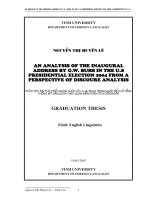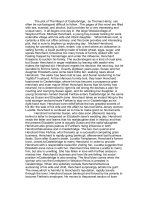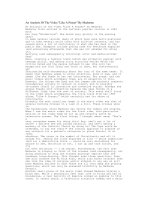an analysis of the video
Bạn đang xem bản rút gọn của tài liệu. Xem và tải ngay bản đầy đủ của tài liệu tại đây (44.64 KB, 2 trang )
An Analysis Of The Video "Like A Prayer" By Madonna
An Analysis of the Video "Like A Prayer" by Madonna
Madonna first arrived in the national popular culture in 1984
with
her song "Borderline". She moved very quickly in the ensuing
years
to make several records (many of which have gone multi-platinum)
and to take several world tours with sold-out concerts, and has
caused quite a bit of controversy in what she has done in the
public eye. Examples include posing nude for Penthouse magazine
(and announcing afterwards that she was not ashamed for doing
it),
marrying (and subsequently divorcing) actor and media-avoider
Sean
Penn, creating a fashion trend (which was primarily popular with
teenage girls), and making truly atrocious movies which the
critics hated and the people refused to see (the only two
exceptions are Dick Tracy and Truth or Dare, her controversial
yet
fascinating self-documentary about her tour of the same name). It
seems that Madonna seems to enjoy attention, good or bad, and it
seems like she feeds on her own controversy. Her songs, and the
music videos which accompany them, are no exception to this.
However, the things she does and the images she projects requests
contemporary society to reflect on itself, and to possibly
re-create itself in innovative and inventive styles. Perhaps she
always breaks with convention because she sees things in a
different light than the rest of society. This essay shall focus
on the video which accompanies the title track from her 1989
album, "Like A Prayer," which certainly had its share of
controversy.
Probably the most startling image in the music video was that of
several burning crosses on a lawn or a hill. These crosses were
in
the background, while Madonna was facing the camera and singing.
When I saw the music video for the first time, this particular
section of the video made me sit up and intently watch my
television screen. The first things I thought about were, "She's
a
very outspoken woman for doing this! Boy, she's got a lot of
nerve! I believe she was raised Catholic, and she's making a
mockery of the Catholic Church by doing so! The Pope would be
offended, to say the least!" The radical approach to dispose of
any religion (or a person's religious or pious fervor) is at
least
shocking. The cross is the symbol of Christianity and all it
stands for. Seeing the cross engulfed in fire which symbolizes
(and is) a destructive force would be very disturbing for
anyone to see, Christian or not. I sat up and took notice, and
I'm
not even Christian I am Jewish. Furthermore, the fact that
Madonna is singing in front of the crosses (and consequently, not
doing anything to stop the crosses burning) implies that she
condones cross-burning. This thought asks three questions. Does
she also condone the Ku Klux Klan, which also burns crosses? Does
she like the idea of religion and/or atheism in any way at all?
Does Madonna believe in God? These are all very deep and probing
questions, which can only be answered truthfully by Madonna
herself.
Another small piece of the music video showed Madonna kissing a
black man. While I personally feel that love is blind and has no
boundaries, a vast majority of America cocked an eyebrow to this
scene. In recent years, a television situation comedy and a major
motion picture have both built on interracial relationships as
the
core of the storyline. "True Colors" was on the Fox Network,
built
around a black man married to a white woman. Spike Lee's movie
"Jungle Fever" also had a black man and a white woman. Lee's
reason why he did a story of a black man and a white woman (and
not a white man and a black woman) was that the white woman has
been stereotyped to be the essence of all beauty, and that the
black man has been stereotyped to be a stud. (It is true that
films and television shows have been made which focused on
relationships between white men and black women; an example is
the
film "Soul Man.") Does Madonna have any feelings for men of other
races? Should America care? Knowing Madonna's sexual liberalism
(she "confessed" to having partial feelings for women in an
interview), has she and/or will she seek out alternative methods
to satisfy her sexuality and her sexual curiosity?
Both Madonna and the controversy she causes are interesting to
watch. The public keeps a sharp eye on what she does because she
is an outspoken individual who knows how to market herself to the
worldwide media. She always strays from the norm, and she always
gives her brash opinions on particular establishments, and acts
on
those opinions afterwards. Many people have many opinions about
her, and many people speak their mind about her. This is what she
likes to listen to people talking about her. She loves the
attention and uses it to her advantage. My opinion of Madonna is
that what she doesn't have in pure talent (and I think that she's
a little lacking in the talent department), she makes up for with
creativity, controversy, intelligence (she attended the
University
of Michigan called by some to be the best public school in the
nation) and sexuality (she is an extremely beautiful woman I
saw her Penthouse layout) to literally guarantee an audience. It
is for this ingenuity that I respect her.









